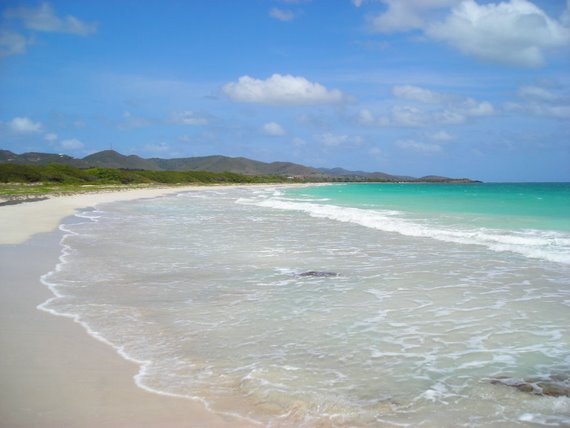Dream of moving to the Caribbean? Spending your days caressed by trade winds, relaxed, soaking up the genial sun . . .Limin’, to use the local phrase. If so, know that when you leave your stress-filled stateside lives you also leave behind a few other aspects of your daily routine, such as: central air conditioning, low electricity rates, curb-side trash pick up, underground gas lines, guaranteed access to high-speed Internet, low-cost dish-based television service, and in most cases city water/sewer and home mail delivery.
Air Conditioning
Used to the climate controlled ice box—you may have difficulty adjusting. Very few locations have central air conditioning. I have witnessed this luxury only in large commercial buildings. Many residents operate window unit AC; however, be prepared for to pay for this convenience. The rental we lived in when we first moved on island was just about 1000 square feet, one window unit and four ceiling fans. Our monthly electricity bill averaged $220.
Too many visitors from the states (continentals) depend on A/C so that local hotels often charge an additional 10 percent energy surtax.
I plan to operate our bed and breakfast sans A/C. Ceiling fans and stationary fans, yes, but no window units. We do not have this convenience in the main house and I hope to compete in local hotel market by being 10 percent cheaper than the next guy. I also hope to entice the kind of guests that want to live like the locals.
Propane
To off set the expensive electrical rates islanders use propane wherever possible. Our stove, clothes dryer (an appliance I rarely use because the clothes line works well) and hot water heater are propane based. Gas is delivered in large tanks, about 4 feet high, and stored outside one’s home. One visitor remarked that this method is akin to having a bomb outside your door. Would the underground gas line then be like having a bomb under one’s house? Out of sight, out of mind, maybe?
Check upcoming entries on the shedding of other stateside conveniences, sharing bathwater with the frogs and a trip to the dump all coming soon.
Island life is different. A new resident’s attitude in accepting these differences determines whether a move to the USVI is paradise or paradise lost. Don’t blame the Islands for not being like the States, blame yourself for an inability to adapt. Limin' is a trade-off.

